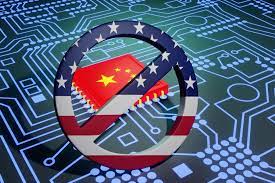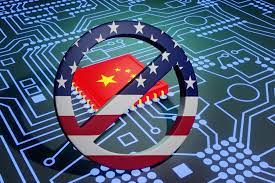
The Dutch government joined the American effort to limit chip exports to China on Wednesday by announcing new restrictions on semiconductor technology exports to safeguard national security.
The announcement represented the Dutch government's first significant step toward adopting regulations urged by Washington to stifle China's chip manufacturing sector and slow its military development. The Dutch government oversees crucial chipmaking technology.
In order for the broad export restrictions put in place by the US in October on shipments of American chipmaking tools to China to be effective, the US also needs other important suppliers, the Netherlands and Japan, who produce crucial chipmaking technology, to agree. The allied nations have been in discussions about this for months.
In a letter to parliament, Dutch Trade Minister Liesje Schreinemacher announced the decision, stating that the restrictions would go into effect before the summer.
Her letter did not specifically mention China, a key Dutch trading partner, or ASML Holding NV, Europe's biggest tech company and a leading supplier to semiconductor manufacturers, but both will be impacted. One technology that will be impacted is "DUV" lithography systems, which are the second-most advanced machines sold by ASML to computer chip manufacturers.
"Because the Netherlands considers it necessary on national security grounds to get this technology into oversight with the greatest of speed, the Cabinet will introduce a national control list," the letter said.
There were no comments on the issue available from a White House representative.
ASML responded that it expects to need to apply for licenses to export the most advanced segment of its DUV machines, but that this will have no impact on its financial guidance for 2023.
ASML dominates the market for lithography systems, multimillion-dollar machines that use powerful lasers to create computer chip circuitry.
The company expects sales in China to remain roughly flat at 2.2 billion euros in 2023, implying a relative shrinkage as overall sales are expected to grow by 25%. Customers such as Taiwan Semiconductor Manufacturing Co 2330.TW and Intel Corp INTC.O are expanding their capacity.
ASML has never sold its most advanced "EUV" machines to Chinese customers, and the majority of its "DUV" sales in China are to less advanced chipmakers. Samsung and SK Hynix 000660.KS, its two largest South Korean customers, both have significant manufacturing capacity in China.
The Dutch announcement raises many questions, including whether ASML will be able to service the more than 8 billion euros ($8.44 billion) in DUV machines sold to Chinese customers since 2014.
The Dutch government, according to Schreinemacher, decided on measures "as carefully and precisely as possible... to avoid unnecessary disruption of value chains."
"It is for companies of importance to know what they are facing and to have time to adjust to new rules," she wrote.
According to sources, Japan will issue an update on its chip equipment export policies as soon as this week.
"For national security reasons we constantly review export rules, but it doesn't mean we have decided anything at this point," Japan's Minister for Economy, Trade and Industry (METI) Yasutoshi Nishimura said in parliament when asked about possible restrictions.
A METI person in charge in export controls told Reuters that no changes were planned for Thursday or Friday. The official, who spoke on the condition of anonymity, stated that he was not authorized to speak to the media.
(Source:wwww.reuters.com)
The announcement represented the Dutch government's first significant step toward adopting regulations urged by Washington to stifle China's chip manufacturing sector and slow its military development. The Dutch government oversees crucial chipmaking technology.
In order for the broad export restrictions put in place by the US in October on shipments of American chipmaking tools to China to be effective, the US also needs other important suppliers, the Netherlands and Japan, who produce crucial chipmaking technology, to agree. The allied nations have been in discussions about this for months.
In a letter to parliament, Dutch Trade Minister Liesje Schreinemacher announced the decision, stating that the restrictions would go into effect before the summer.
Her letter did not specifically mention China, a key Dutch trading partner, or ASML Holding NV, Europe's biggest tech company and a leading supplier to semiconductor manufacturers, but both will be impacted. One technology that will be impacted is "DUV" lithography systems, which are the second-most advanced machines sold by ASML to computer chip manufacturers.
"Because the Netherlands considers it necessary on national security grounds to get this technology into oversight with the greatest of speed, the Cabinet will introduce a national control list," the letter said.
There were no comments on the issue available from a White House representative.
ASML responded that it expects to need to apply for licenses to export the most advanced segment of its DUV machines, but that this will have no impact on its financial guidance for 2023.
ASML dominates the market for lithography systems, multimillion-dollar machines that use powerful lasers to create computer chip circuitry.
The company expects sales in China to remain roughly flat at 2.2 billion euros in 2023, implying a relative shrinkage as overall sales are expected to grow by 25%. Customers such as Taiwan Semiconductor Manufacturing Co 2330.TW and Intel Corp INTC.O are expanding their capacity.
ASML has never sold its most advanced "EUV" machines to Chinese customers, and the majority of its "DUV" sales in China are to less advanced chipmakers. Samsung and SK Hynix 000660.KS, its two largest South Korean customers, both have significant manufacturing capacity in China.
The Dutch announcement raises many questions, including whether ASML will be able to service the more than 8 billion euros ($8.44 billion) in DUV machines sold to Chinese customers since 2014.
The Dutch government, according to Schreinemacher, decided on measures "as carefully and precisely as possible... to avoid unnecessary disruption of value chains."
"It is for companies of importance to know what they are facing and to have time to adjust to new rules," she wrote.
According to sources, Japan will issue an update on its chip equipment export policies as soon as this week.
"For national security reasons we constantly review export rules, but it doesn't mean we have decided anything at this point," Japan's Minister for Economy, Trade and Industry (METI) Yasutoshi Nishimura said in parliament when asked about possible restrictions.
A METI person in charge in export controls told Reuters that no changes were planned for Thursday or Friday. The official, who spoke on the condition of anonymity, stated that he was not authorized to speak to the media.
(Source:wwww.reuters.com)





